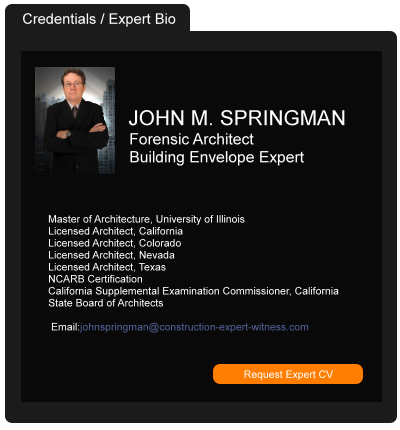Recovering Unabsorbed Home Office Overhead Due to Delay
May 30, 2022 —
David Adelstein - Florida Construction Legal UpdatesIn the
preceding article, I discussed the use of a retrospective as-built delay analysis in a case before the Civilian Board of Contract Appeals (CBCA). This case also discussed a damages component in certain delay claims known as unabsorbed home office overhead—a challenging damages component to recover because this deals with indirect costs as opposed to direct costs.
Unabsorbed home office overhead is a damages component when the contractor is on standby, but this is NOT as easy as just claiming standby thereby you are automatically entitled to unabsorbed home office overhead. There are requirements that MUST be met.
To obtain an equitable adjustment for unabsorbed home office overhead as compensation for being on standby, [the contractor] must initially show “[1] a government-caused delay of uncertain duration,” that “[2] the delay extended the original time for performance” or precluded the contractor from finishing earlier than scheduled, and that “[3] the contractor [was] on standby and unable to take on other work during the delay period.
CTA I, LLC v. Department of Veteran Affairs, CBCA 5826, 2022 WL 884710 (CBCA 2022) quoting Nicon, Inc. v. U.S., 331 F.3d 878, 883 (Fed. Cir. 2003).
Read the court decisionRead the full story...Reprinted courtesy of
David Adelstein, Kirwin Norris, P.A.Mr. Adelstein may be contacted at
dma@kirwinnorris.com
WSDOT Seeks Retraction of Waiver Excluding Non-Minority Woman-Owned Businesses from Participation Goals
September 28, 2017 —
Lindsay K. Taft - Ahlers & Cressman PLLCIf you are a regular reader of our blog, you will likely recognize that our firm has been actively involved and concerned with the results of Washington State Department of Transportation’s (“WSDOT”) Disparity Study, which impacts both Disadvantaged Business Enterprises (“DBE”) and general contractors who bid on federally-funded projects with DBE goals. On June 1, 2017, WSDOT implemented a “waiver”, which excluded Caucasian women-owned firms (“WBEs”) from qualifying for Condition of Award DBE Goals on federally-funded projects. This drastic action was the result of WSDOT’s highly criticized 2012 Disparity Study conducted by BBC Research & Consulting of Denver, Colorado, which concluded non-minority women-owned firms do not face “substantial disparities” in the federally-funded transportation contracting market.
BBC’s study was criticized for a number of reasons, but most concerning was BBC’s flawed and unreliable statistical methodology that did not accurately represent true marketplace conditions. See Ahlers & Cressman letter of January 9, 2014 and Associated General Contractors of Washington article. For example, BBC’s results showed both decreasing WBE availability and availability vastly out of range with other states (e.g., the availability of women-owned construction firms in Washington was just 1.5% compared to 11.96% in Oregon). Nevertheless, based on this flawed BBC study and BBC’s assertion that women-owned firms did not face disparities, WSDOT sought and on June 1, 2017 was granted a waiver precluding general contractors from counting WBE firms towards their DBE goals on federally funded public works projects.
Read the court decisionRead the full story...Reprinted courtesy of
Lindsay Taft, Ahlers & Cressman PLLCMs. Taft may be contacted at
ltaft@ac-lawyers.com
TOLLING AGREEMENTS: Construction Defect Lawyers use them to preserve Association Warranty Claims during Construction Defect Negotiations with Developers
March 07, 2014 —
Nicholas D. Cowie – Maryland Condo Construction Defect Law BlogIf properly drafted, a tolling agreement stops, or “tolls,” the running of the statue of limitations and other time periods aplicable to an association’s legal claims while it attempts to negotiate the repair of and/or monetary compensation for construction deficiencies with the developer and other responsible parties. In short, it is a “time -out” that allows and association to preserve its legal claim so it can focus on settling its claims rather than pursing them in court.
Too often, condominium associations and homeowner associations (“HOA”) unknowingly allow their legal claims for construction defects to expire during lengthy negotiations with developers and builders. If negotiations fail, the association may turn to a construction defect attorney for legal representation only to find their construction defect legal claims are time barred because the statute of limitations or other legal time period has expired.
This article explains how condominium associations and HOAs can avoid this scenario by the use of tolling agreements to preserve their legal claims while engaged in potentially lengthy negotiations with developers to correct construction defects.
Read the court decisionRead the full story...Reprinted courtesy of
Nicholas D. Cowie, Maryland Condo Construction Defect Law BlogMr. Cowie may be contacted at
ndc@cowiemott.com
Court Requires Adherence to “Good Faith and Fair Dealing” in Construction Defect Coverage
September 30, 2011 —
CDJ STAFFThe California Court of Appeals has ruled in the case of Allied Framers, Inc. v. Golden Bear Insurance Company. Allied had been sued in a construction defect case and its primary insurer had become insolvent. Coverage for Allied’s defense was paid for by the California Insurance Guarantee Association through June 8, 2006. When warned that CIGA’s involvement was ending, Allied notified Golden Bear, which declined to provide coverage.
In the matters that followed, Golden Bear claimed that Allied had not exhausted its $1 million in primary insurance. Allied then showed that $1 million had already been paid out in the case. A few months thereafter, Golden Bear offered a $500,000 settlement on behalf of Allied which was rejected. Thereafter, Golden Bear hired new counsel to defend Allied. Golden Bear received, but allegedly did not pay, invoices Allied sent from their former counsel. Golden Bear finally settled the construction defect case for $2 million.
Allied’s original counsel sued Allied for payment. Golden Bear declined coverage. Allied then claimed that Golden Bear liable on several counts, arising from its failure to settle the construction defect action earlier than it did and its failure to pay Allied’s counsel. Golden Bear demurred, arguing that Allied had now exhausted is coverage with the $2 million settlement. The lower court sustained Golden Bear’s demurrer, dismissing Allied’s complaints.
The appeal court reviewed Allied’s seven complaints and sustained most of them. However, the court did reverse the trial court’s order in regard to Allied’s complaint that Golden Bear breached an implied covenant of good faith and fair dealing. The appeals court was not convinced that Golden Bear properly evaluated the settlement demand in the underlying construction defect case. The court found three other ways in which Golden Bear’s actions might show bad faith, in refusing to pay defense fees “after promising [Allied] such costs would be paid in full,” “failing to advise Allied about ‘actual or potential negative consequences of agreeing to the proposed settlement,’” and that their choice of counsel “failed to protect [Allied’s] interests in the negotiation.”
Read the court’s decision…
Read the court decisionRead the full story...Reprinted courtesy of
Pennsylvania: Searching Questions Ahead of Oral Argument in Domtar
October 08, 2014 —
Robert Caplan – White and Williams LLPIf you have been following our coverage of Liberty Mutual Insurance Company v. Domtar Paper Co., you will recall that the Supreme Court of Pennsylvania decided on May 29, 2014 to hear the subrogated insurer’s appeal,1 despite the Superior Court’s holding against the subrogated insurer—based primarily on its own defective case law2 —and its denial of reargument, presumably due to the insurer’s briefing follies.3
The parties in Domtar, as well as numerous amici curiae (friends of the court),4 have submitted their respective briefs over the last few months, and the Supreme Court has scheduled oral argument to take place on October 8, 2014 in Pittsburgh, Pa. The Court has framed the issue as: “Does Section 319 of the Pennsylvania Workers’ Compensation Act, 77 P.S. § 671, allow the employer/insurer to step into the shoes of the insured employee to subrogate against the tortfeasor?”5
There are three possible outcomes in Domtar.
The first (and easiest) possible outcome for the Supreme Court would be to punt to the Pennsylvania General Assembly for a decision on the issue. Workers’ compensation legislation, perhaps more than any other type of legislation, “creates a highly structured balancing of competing interests.”6 It is basic civics that the legislature has a “superior ability to examine social policy issues and determine legal standards so as to balance competing concerns.”7
Read the court decisionRead the full story...Reprinted courtesy of
Robert Caplan, White and Williams LLPMr. Caplan may be contacted at
caplanr@whiteandwilliams.com
Courthouse Reporter Series: The Travails of Statutory Construction...Defining “Labor” under the Miller Act
August 01, 2023 —
Brendan J. Witry - The Dispute ResolverIn a recent case—United States ex rel. Dickson v. Fidelity & Deposit Co. of Maryland (“Dickson”)—the U.S. Court of Appeals for the Fourth Circuit recently re-examined and defined what work qualifies as “labor” under the Miller Act.
United States ex rel. Dickson v. Fidelity & Deposit Co. of Maryland, No. 21-160, 67 F.4th 182 (4th Cir. April 26, 2023) (slip op.).
Unlike private projects, unpaid subcontractors cannot encumber the federal government’s property with mechanics liens. Instead, the Miller Act provides a remedy for subcontractors in the form of a payment bond on all federal public works contracts exceeding $100,000. 40 U.S.C. § 3131(b).
In the Dickson case, Claimant Elliot Dickson served as a subcontractor to Forney Enterprises (“Forney”), with whom the Department of Defense (the “DOD”) contracted to renovate several staircases and the fire suppression systems at the Pentagon.
Read the court decisionRead the full story...Reprinted courtesy of
Brendan J. Witry, Conway & Mrowiec Attorneys LLLPMr. Witry may be contacted at
bjw@cmcontractors.com
Finding Insurer's Declaratory Relief Action Raises Unsettled Questions of State Law, Case is Dismissed
November 05, 2024 —
Tred R. Eyerly - Insurance Law HawaiiThe federal district court for the District of Hawaii dismissed the insurer's action for declaratory relief because it raised issues that were unsettled by Hawaii courts. Association of Apartment Owners of Lahaina Residential Condominium, et al., No. 1-24-cv-00075-JAO-BMK, Order Granting AOAO's Motion to Dismiss (D. Haw. Aug. 29, 2024).
The case addressed whether a property damage exclusion barred coverage over an owner's claim that a condominium association and its property manager failed to obtain adequate insurance before the condominium's property was damaged by the Maui wildfire in August 2023. Great American filed suit seeking a declaration that it had no duty to defend or indemnify the Association and the property manage, Quam Properties Hawaiiana, Inc., in connection with a demand for mediation submitted to the Association and Quam on behalf of one of the owners.
Read the court decisionRead the full story...Reprinted courtesy of
Tred R. Eyerly, Damon Key Leong Kupchak HastertMr. Eyerly may be contacted at
te@hawaiilawyer.com
CDJ’s Year-End Review: The Top 12 CD Topics of 2015
December 30, 2015 —
Beverley BevenFlorez-CDJ STAFFAs a new year begins, Construction Defect Journal has put together the most important issues and topics relating to the construction defect industry in 2015. New cases have arisen to challenge Right to Repair laws and other construction-related claim procedures, some states have made legislative or code changes, as well as other intriguing topics have been discussed in board rooms and over conference calls. We hope you enjoy the look-back at 2015, and we wish you and yours a prosperous 2016.
Read the court decisionRead the full story...Reprinted courtesy of


































































